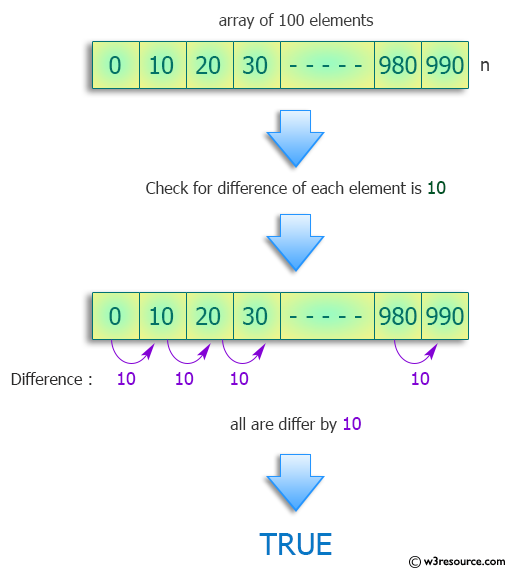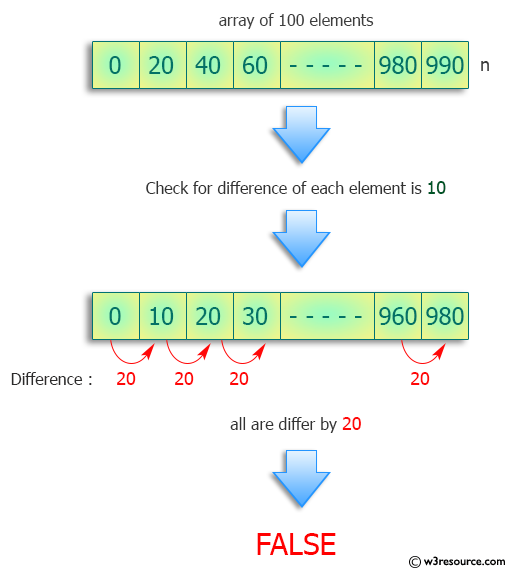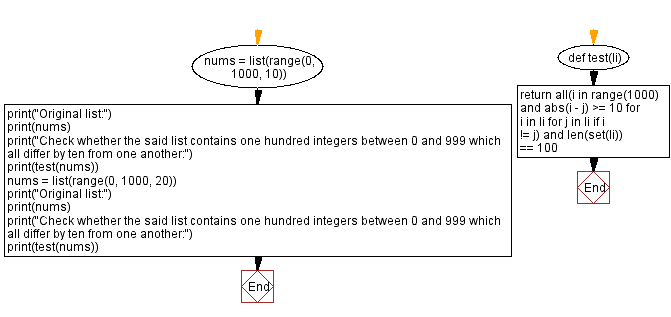Python: Find a list of one hundred integers between 0 and 999 which all differ by ten from one another
List Integers Differ by Ten
Write a Python program to test a list of one hundred integers between 0 and 999, which all differ by ten from one another. Return True otherwise False.
Input: [0, 10, 20, 30, 40, 50, 60, 70, 80, 90, 100, 110, 120, 130, 140, 150, 160, 170, 180, 190, 200, 210, 220, 230, 240, 250, 260, 270, 280, 290, 300, 310, 320, 330, 340, 350, 360, 370, 380, 390, 400, 410, 420, 430, 440, 450, 460, 470, 480, 490, 500, 510, 520, 530, 540, 550, 560, 570, 580, 590, 600, 610, 620, 630, 640, 650, 660, 670, 680, 690, 700, 710, 720, 730, 740, 750, 760, 770, 780, 790, 800, 810, 820, 830, 840, 850, 860, 870, 880, 890, 900, 910, 920, 930, 940, 950, 960, 970, 980, 990] Output: True Input: [0, 20, 40, 60, 80, 100, 120, 140, 160, 180, 200, 220, 240, 260, 280, 300, 320, 340, 360, 380, 400, 420, 440, 460, 480, 500, 520, 540, 560, 580, 600, 620, 640, 660, 680, 700, 720, 740, 760, 780, 800, 820, 840, 860, 880, 900, 920, 940, 960, 980] Output: False
Visual Presentation:


Sample Solution:
Python Code:
# License: https://bit.ly/3oLErEI
# Define a function named 'test' that takes a list 'li' as input
def test(li):
# Check if all elements in 'li' are within the range [0, 999] and have a minimum absolute difference of 10
# Also, ensure that all elements are distinct and there are exactly 100 unique elements in 'li'
return all(i in range(1000) and abs(i - j) >= 10 for i in li for j in li if i != j) and len(set(li)) == 100
# Create a list 'nums' containing one hundred integers from 0 to 999 with a difference of 10 between each pair
nums = list(range(0, 1000, 10))
# Print the original list
print("Original list:")
print(nums)
# Print the result of the test function applied to the 'nums' list
print("Check whether the said list contains one hundred integers between 0 and 999 which all differ by ten from one another:")
print(test(nums))
# Create a different list 'nums' containing one hundred integers from 0 to 999 with a difference of 20 between each pair
nums = list(range(0, 1000, 20))
# Print the original list
print("\nOriginal list:")
print(nums)
# Print the result of the test function applied to the modified 'nums' list
print("Check whether the said list contains one hundred integers between 0 and 999 which all differ by ten from one another:")
print(test(nums))
Sample Output:
Original list: [0, 10, 20, 30, 40, 50, 60, 70, 80, 90, 100, 110, 120, 130, 140, 150, 160, 170, 180, 190, 200, 210, 220, 230, 240, 250, 260, 270, 280, 290, 300, 310, 320, 330, 340, 350, 360, 370, 380, 390, 400, 410, 420, 430, 440, 450, 460, 470, 480, 490, 500, 510, 520, 530, 540, 550, 560, 570, 580, 590, 600, 610, 620, 630, 640, 650, 660, 670, 680, 690, 700, 710, 720, 730, 740, 750, 760, 770, 780, 790, 800, 810, 820, 830, 840, 850, 860, 870, 880, 890, 900, 910, 920, 930, 940, 950, 960, 970, 980, 990] Check whether the said list contains one hundred integers between 0 and 999 which all differ by ten from one another: True Original list: [0, 20, 40, 60, 80, 100, 120, 140, 160, 180, 200, 220, 240, 260, 280, 300, 320, 340, 360, 380, 400, 420, 440, 460, 480, 500, 520, 540, 560, 580, 600, 620, 640, 660, 680, 700, 720, 740, 760, 780, 800, 820, 840, 860, 880, 900, 920, 940, 960, 980] Check whether the said list contains one hundred integers between 0 and 999 which all differ by ten from one another: False
Flowchart:

For more Practice: Solve these Related Problems:
- Write a Python program to test if a list of one hundred integers between 0 and 999 forms an arithmetic sequence with a common difference of 10.
- Write a Python program to verify whether all consecutive integers in a list differ exactly by 10 using a for-loop and comparison of adjacent elements.
- Write a Python program to determine if a sorted list of integers has a constant difference of 10 between every pair of successive elements.
- Write a Python program to check the condition using list comprehension and the all() function to ensure each gap equals 10.
Go to:
Previous: Check the nth-1 string is a proper substring of nth string of a given list of strings.
Next: List of integers where the sum of the first i integers is i.
Python Code Editor :
Have another way to solve this solution? Contribute your code (and comments) through Disqus.
What is the difficulty level of this exercise?
Test your Programming skills with w3resource's quiz.
